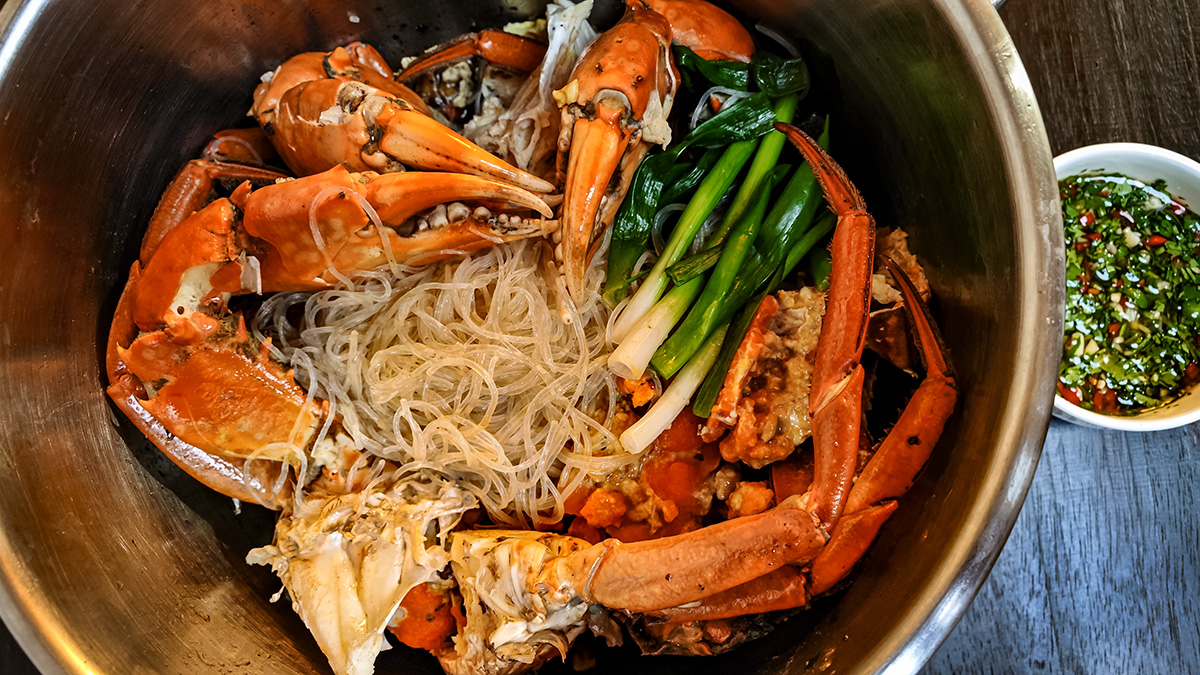Clem's
Pu Ob Woon Sen (Crab with glass noodles baked in a small
pan)
This is food from the streets of Bangkok. It can feature either crab (usually mud crab), or large prawns (in which case the dish would be, Goong Ob Woon Sen in Thai).
The dish is prepared in a container such as a saucepan, pot or claypot with a tight lid such that the contents can be baked/steamed via heat applied below it. Heat, steam and volatile aromatics rise from the bottom of the heated pot to cook the food above. Therefore, the essentials are: good seafood, tight cooking pot, and, aromatic herbs and spices.
Here's how you cook it:

Pu Ob Woon Sen by Clem
INGREDIENTS
- About 1 kg Mud crab (or less of
large prawns).
- A handful of spring onions.
- A handful of fresh coriander.
- 4 - 5 cloves of garlic.
- 1 heaped teaspoon of black pepper,
cracked.
- 1 heaped teaspoon
of Szechuan pepper, crushed.
- A few slices of
ginger.
- A few tablespoons of cooking oil
or preferentially, lard.
- Glass noodles
(quantity as you desire).
Typically made from mung bean starch.
Sauce for the glass noodles:
- Tablespoon or more of oyster sauce.
- Table spoon of light soy sauce.
- A few dashes of white pepper powder.
- A couple of tablespoons of water.
The amount of water is usually more than this but added bit by bit as required during the glass noodle steaming stage.
METHOD
- Clean and cut the crabs to serving
size.
- Soak the glass noodles in cold water.
- In an appropriately sized saucepan
or pot, line the bottom with:
Sliced ginger, a few handfuls of spring onions (cut to size), chopped fresh coriander (include roots if present), the garlic, the Szechuan pepper, the Black Pepper. I also added a whole sliced chill for added spiciness.
- Add the cooking oil or lard to the
pot.
- Heat the pot until you hear the
oil start to cook the herbs and spices.
- Lay the crab pieces on top of the
herbs/spices.
- Close the lid of
the pot and adjust the flame to make for a nice sizzle (not
too hot or else the contents may burn).
- Note that there is hardly any
water in the pot at this stage and it is frying that is
going on at this stage.
Volatile aromatics will start to circulate in the container and permeate the crab.
This is a key feature of the dish without which the dish will fail.
Also, heat will start baking the crab.
-
Monitor the cooking constantly to ensure that burning does
not occur.
If it does, then turn the heat down and add a little bit of water.
- Some 10 to 15
minutes later, drain the glass noodles and add the glass
noodle
sauce made up of the ingredients listed above.
- Now add the
sauced glass noodles on top of the cooking crabs, and close the
lid.
- Monitor the
cooking of the glass noodles.
You want it as soft as you prefer.
- During the
cooking of the glass noodles, add small amounts of water as
required to:
- Allow enough steam to be produced to cook the noodles and further cook the crabs/release more aromatics;
- Allow for
enough gravy to form at the bottom of the saucepan/pot from
all the infusion of crab juices, herbs and spices.
This gravy is important as it is used to coat the glass noodles before serving/eating.
- In the last few
minutes before the noodles are done, add a handful of
spring onions and let them wilt in the steam in the pot.
- When the
noodles are done to your satisfaction, it is time to serve
the dish.
-
Serve directly in the saucepan/pot, or re-assemble in a
bowl.
Remember to coat the glass noodles in the gravy which lies at the bottom of the saucepan/pot before serving.
Enjoy!
01 September 2024
Created by Clem Kuek
